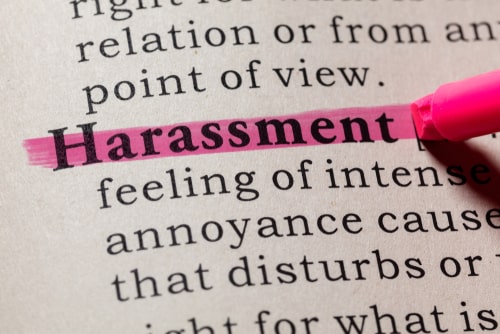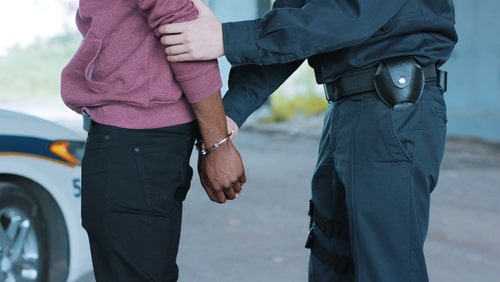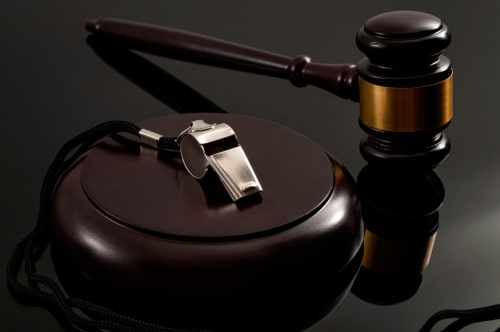Recent Blog Posts
3 Ways to Improve Your Chances at a Successful Civil Service Appeal
 Facing a civil service disciplinary appeal in New York can be an intimidating process. With so much on the line, it is crucial to take the right approach to the situation, as the right approach can increase your chances of obtaining an outcome you can be satisfied with. But what is the most effective way to determine what the correct approach is? This is where an attorney can be enormously helpful. Here are three strategies to improve your chances of a successful outcome in your case.
Facing a civil service disciplinary appeal in New York can be an intimidating process. With so much on the line, it is crucial to take the right approach to the situation, as the right approach can increase your chances of obtaining an outcome you can be satisfied with. But what is the most effective way to determine what the correct approach is? This is where an attorney can be enormously helpful. Here are three strategies to improve your chances of a successful outcome in your case.
Understand the Disciplinary Charges Thoroughly
The first step in crafting a strong appeal is to understand the specific disciplinary charges against you. Carefully review the notice of discipline (NOD) and identify any discrepancies, factual inaccuracies, or procedural errors. Note any timelines and deadlines mentioned in the NOD, as closely following these deadlines will be crucial to your case.
Potential Penalties if Found Guilty in the New York Civil Service Disciplinary Process
 Going through the New York civil service disciplinary process can be a daunting experience. If you find yourself the subject of such a process, it is important to understand the potential penalties you could face if found guilty of misconduct or incompetence. In New York, disciplinary actions can range from a formal reprimand to termination from employment. If you are facing disciplinary action, obtain legal representation from a skilled attorney to ensure you can fight the charges and pursue a favorable case outcome.
Going through the New York civil service disciplinary process can be a daunting experience. If you find yourself the subject of such a process, it is important to understand the potential penalties you could face if found guilty of misconduct or incompetence. In New York, disciplinary actions can range from a formal reprimand to termination from employment. If you are facing disciplinary action, obtain legal representation from a skilled attorney to ensure you can fight the charges and pursue a favorable case outcome.
Formal Reprimand
One of the mildest penalties you might encounter is a formal reprimand. This written notice serves as an official record that you have been found guilty of some form of misconduct or incompetence. While it might not seem severe, a formal reprimand is a serious issue as it remains part of your employment record. Future infractions could lead to stricter penalties and may impact your career progression and reputation within the civil service.
Navigating Disciplinary Matters for Civil Service Employees in New York
 For civil service employees in New York, maintaining high standards of conduct is essential both during working hours and outside the workplace. When these standards are breached, it can result in disciplinary actions that jeopardize an employee’s career. If you are a civil service employee facing disciplinary action, contact a lawyer for legal assistance.
For civil service employees in New York, maintaining high standards of conduct is essential both during working hours and outside the workplace. When these standards are breached, it can result in disciplinary actions that jeopardize an employee’s career. If you are a civil service employee facing disciplinary action, contact a lawyer for legal assistance.
Misconduct in the Workplace
In the realm of civil service, misconduct covers a broad spectrum of behaviors that violate established policies and undermine professional integrity. This can include:
-
Insubordination – Failing to obey reasonable orders from superiors can lead to serious consequences.
What is the Difference Between Medical Separation and Disciplinary Termination?
 In the realm of civil service employment in New York, two distinct pathways can lead to the end of an employee’s tenure: medical separation and disciplinary termination. Both processes carry significant implications for the affected employee, but they arise from entirely different circumstances and follow different procedural routes. If you are a tenured civil service employee seeking to navigate either the medical separation or disciplinary termination process, a qualified New York attorney can assist you.
In the realm of civil service employment in New York, two distinct pathways can lead to the end of an employee’s tenure: medical separation and disciplinary termination. Both processes carry significant implications for the affected employee, but they arise from entirely different circumstances and follow different procedural routes. If you are a tenured civil service employee seeking to navigate either the medical separation or disciplinary termination process, a qualified New York attorney can assist you.
Medical Separation Means a Health Driven Departure
Medical separation occurs when an employee is unable to perform the duties of his or her position due to a medical condition. This condition could be physical or psychological and often requires substantial medical documentation to back up the claim. The process typically begins when the employer provides medical evidence that the employee cannot continue to perform his or her job duties. A physician’s certification and potentially an independent medical examination may be necessary. Moreover, employees can appeal a medical separation decision if he or she believes the decision was not justified. This involves providing additional medical evidence or demonstrating reasonable accommodation was not adequately considered.
Three Ways a Lawyer Can Help You in a New York Civil Service Investigative Interview
 Navigating a New York investigative interview as a civil service employee can be complex and nerve-wracking, which makes the hiring of a seasoned attorney essential to ease the difficulty of the process. Using his or her extensive experience, a competent attorney can help you thoroughly prepare, provide advice on protecting your rights, and accompany you during the interview to provide legal and moral support.
Navigating a New York investigative interview as a civil service employee can be complex and nerve-wracking, which makes the hiring of a seasoned attorney essential to ease the difficulty of the process. Using his or her extensive experience, a competent attorney can help you thoroughly prepare, provide advice on protecting your rights, and accompany you during the interview to provide legal and moral support.
Using his 25 years of legal experience, Attorney Watford at The Law Firm of Gregory J. Watford, Esq., PLLC is an exceptional attorney that can provide clients a significant edge when facing an investigative interview. Attorney Watford knows the legal system and is ready to provide key assistance as you prepare and undergo your investigative interview.
Thorough Preparation for Your Investigative Interview
In the vast majority of legal matters, the first step to a favorable outcome, especially when dealing with the prospect of an investigative interview, is adequate preparation. However, the right amount of preparation can only be truly achieved through a robust understanding of the law. That is where your attorney will come into play. He or she will be able to comprehend the issues at hand, what kind of questions you could be asked in the interview, and how to structure your answers effectively. Your lawyer will walk you through various scenarios, preparing you for what you may expect behind closed doors when it is time for the interview.
What to Know About Section 75 and Civil Service Law in New York
 Employee discipline is a complex and often challenging aspect of the employer-employee relationship, especially in the state of New York. Understanding the legal framework surrounding employee discipline is important for both employers and employees to understand. Section 75 of the New York Civil Service Law plays a considerable role in protecting the rights of public employees facing disciplinary actions. If your public sector employer has begun threatening you with disciplinary action, you need an experienced attorney to protect your rights and interests.
Employee discipline is a complex and often challenging aspect of the employer-employee relationship, especially in the state of New York. Understanding the legal framework surrounding employee discipline is important for both employers and employees to understand. Section 75 of the New York Civil Service Law plays a considerable role in protecting the rights of public employees facing disciplinary actions. If your public sector employer has begun threatening you with disciplinary action, you need an experienced attorney to protect your rights and interests.
At The Law Firm of Gregory J. Watford, Esq., PLLC, our knowledgeable attorney has the resources and skills to provide you with the legal insights and defense that you need to navigate this stressful process effectively. We work closely with each of our clients to ensure they have the best possible chance at obtaining a case outcome in his or her favor.
Is Stalking and Harassment the Same Crime in New York?
 In New York, stalking and harassment are two distinct crimes under the law. While both involve unwanted behavior that causes fear or distress to the victim, key differences exist between the two offenses. If you are facing criminal charges related to stalking, harassment, or both, hiring a seasoned criminal defense attorney is important to protect yourself against the worst-case scenario: a conviction of the charges you face.
In New York, stalking and harassment are two distinct crimes under the law. While both involve unwanted behavior that causes fear or distress to the victim, key differences exist between the two offenses. If you are facing criminal charges related to stalking, harassment, or both, hiring a seasoned criminal defense attorney is important to protect yourself against the worst-case scenario: a conviction of the charges you face.
With over ten years of law enforcement experience, Attorney Watford at The Law Firm of Gregory J. Watford, Esq., PLLC understands how criminal law works from both sides. Now, as an attorney, Mr. Watford possesses abundant experience and is ready and able to defend clients against various criminal charges, including those that involve stalking and harassment.
The Crime of Stalking in New York
In New York, stalking is considered a grave crime characterized by a consistent pattern of behavior aimed at instilling fear or causing harm to another individual. The state's legal framework defines stalking as any repeated conduct targeted at a specific person that would reasonably lead someone to fear for their safety or the safety of others. This could encompass actions like following an individual, issuing threats, or other unwelcome activities that provoke fear or a sense of intimidation.
Three Defense Strategies for Criminal Weapons Possession in New York
 Criminal weapons possession charges in New York state can carry very serious consequences, including potential fines and imprisonment. When facing such charges, individuals need to explore effective defense strategies to protect their rights and look to avoid a criminal conviction. Hiring a lawyer is an essential step if you are facing charges, as understanding the available defense tactics can be instrumental in building a solid case against criminal weapons possession allegations.
Criminal weapons possession charges in New York state can carry very serious consequences, including potential fines and imprisonment. When facing such charges, individuals need to explore effective defense strategies to protect their rights and look to avoid a criminal conviction. Hiring a lawyer is an essential step if you are facing charges, as understanding the available defense tactics can be instrumental in building a solid case against criminal weapons possession allegations.
New York State Defense Strategies for Criminal Weapons Possession
-
Unlawful search and seizure – One of the most common defense strategies for criminal weapons possession charges in New York is to challenge the legality of the search and seizure that led to the discovery of the alleged weapon. If law enforcement conducted a search warrantless or without probable cause, any evidence obtained during that search may be non-admissible. By asserting that the search violated the defendant’s Fourth Amendment rights, it may be possible to suppress the weapon-related evidence, weakening the prosecution’s case.
Do Civil Service Employees Have Whistleblower Protections in New York?
 Civil service employees are a vital part of the workforce in the state of New York. They play an important role in ensuring that government operations run smoothly and effectively while also upholding the principles of transparency and accountability. However, when civil service employees witness illegal or unethical behavior by government organizations or their employees, they may be uncertain about how to proceed.
Civil service employees are a vital part of the workforce in the state of New York. They play an important role in ensuring that government operations run smoothly and effectively while also upholding the principles of transparency and accountability. However, when civil service employees witness illegal or unethical behavior by government organizations or their employees, they may be uncertain about how to proceed.
In some cases, they may worry that they could face retaliation if they speak out and that they could potentially lose their jobs. These are valid concerns, and they highlight the importance of whistleblower protections. In cases where civil service employees face disciplinary actions or termination for blowing the whistle, they will need to understand how they can protect their rights and avoid discipline. Protecting your rights begins with hiring an experienced attorney.
Medical Separation and Discipline for Civil Service Workers in New York
 Working as a civil service employee in New York comes with a unique set of challenges. While tenured civil service employees can receive protection against the loss of their jobs, there are some situations where employees may face termination due to medical separation or disciplinary action. These situations can create anxiety, uncertainty, and financial pressures, and it is essential for civil service employees to understand the steps they can take to protect themselves and avoid a potential loss of income. Contact a lawyer for the assistance you need today.
Working as a civil service employee in New York comes with a unique set of challenges. While tenured civil service employees can receive protection against the loss of their jobs, there are some situations where employees may face termination due to medical separation or disciplinary action. These situations can create anxiety, uncertainty, and financial pressures, and it is essential for civil service employees to understand the steps they can take to protect themselves and avoid a potential loss of income. Contact a lawyer for the assistance you need today.
Medical Separation
In cases where civil service employees have disabilities or other medical conditions that prevent them from performing their duties, employers may seek to terminate their employment. A leave of absence may be required if an employee cannot fully perform the duties of their position, and if a person has been unable to work for a continuous period of 365 days, the employer may seek a termination. These cases may be handled differently depending on whether an injury or illness was work-related or whether a person has experienced an "ordinary disability." Employees who have been terminated or required to take a leave of absence may seek reinstatement within one year of medical separation.

 646-580-6675
646-580-6675





